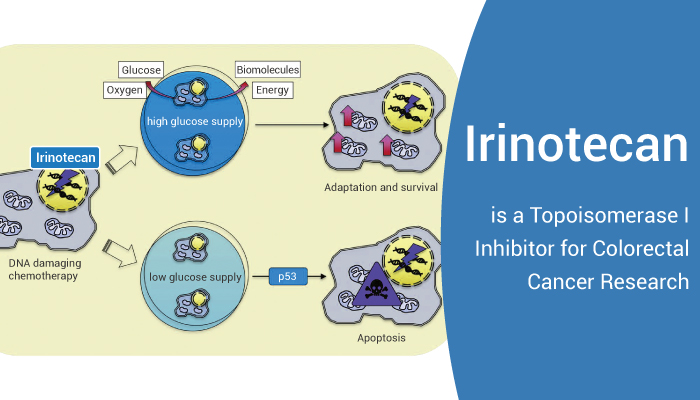Colorectal cancer represents 15% of all cancers in Western countries, and is the most frequently observed. Nowadays, colorectal cancer is the world’s fourth most deadly cancer with almost 900,000 deaths annually. Besides an ageing population and dietary habits of high-income countries, unfavourable risk factors such as obesity, lack of physical exercise, and smoking increase the risk of colorectal cancer. According to study datas, topoisomerase I plays an important role in colorectal cancer. Because topoisomerase I is a nuclear enzyme that essential for DNA repair, replication and transcription. Hence, we will introduce Irinotecan (CPT-11) a topoisomerase I inhibitor.
Irinotecan is a topoisomerase I inhibitor for cancer research.
Irinotecan is a water soluble semisynthetic derivative of camptothecin, a plant alkaloid isolated from the Chinese tree Camptotheca acuminata. Moreover, Irinotecan and its analogs represent a new class of anticancer agents.
In vitro, Irinotecan inhibits the growth of LoVo and HT-29 cells, with IC50s of 15.8 μM and 5.17 μM, respectively. In addition, Irinotecan induces similar amounts of cleavable complexes in both in LoVo and HT-29 cells. Besides, Irinotecan suppresses the proliferation of human umbilical vein endothelial cells (HUVEC), with an IC50 of 1.3 μM.
In vivo, Irinotecan (5 mg/kg) significantly inhibits the growth of tumors by intratumoral injection daily for 5 days. In addition, on two consecutive weeks in rats, and such effects also occur via continuous intraperitoneal infusion by osmotic minipump into mice. Moreover, Irinotecan (100-300 mg/kg, i.p.; 21 days) apparently suppresses tumor growth of HT-29 xenografts in athymic female mice.
In a word, Irinotecan is a promising agent for cancer research, such as colorectal cancer.
Reference:
[1] Dekker E, et al. Lancet. 2019 Oct 19;394(10207):1467-1480.
[2] Si J, et al. Int J Pharm. 2019 Sep 10;568:118499.
[3] Pavillard V, Aet al. Cancer Chemother Pharmacol. 2002 Apr;49(4):329-35.
